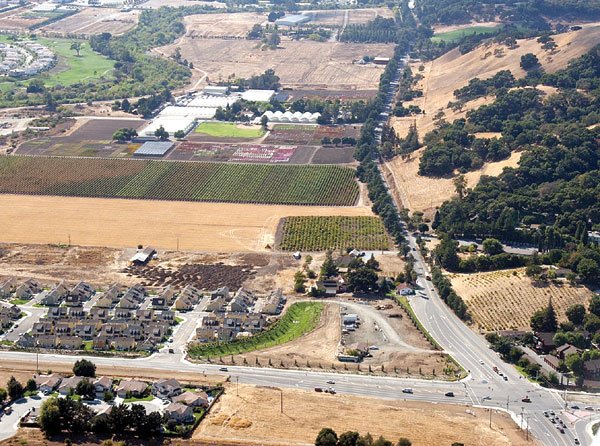Gilroy
– Like gardeners plucking weeds from the soil, city council
members began combing through the Hecker Pass Specific Plan Monday
night to prune out aspects they see as a threat to the rural
character of the area.
Gilroy – Like gardeners plucking weeds from the soil, city council members began combing through the Hecker Pass Specific Plan Monday night to prune out aspects they see as a threat to the rural character of the area.
Councilmen pulled from the list a number of potential land uses and reduced the total number of housing units they would allow in the Hecker Pass project area, a corridor stretching along Route 152 from Santa Teresa Boulevard to the Gilroy public golf course.
While their decisions are not yet final, councilmen agreed in word to scale back the number of housing units from 530 to about 490. The final number will depend on a density formula, sketched out by councilmen, that equates to about 1.16 houses per acre in residential areas, according to City Planner Melissa Durkin.
She said the formula will only affect the southwestern strip of the project area – once owned by Bonfante Gardens – by cutting about half the originally proposed 85 units.
“We’re making their density consistent with the other residential clusters in the area,” Durkin explained.
Council members also pared down a list of proposed land uses in three farm-related areas: agricultural, agri-commercial, and agri-tourism.
In the agri-commercial and agri-tourism areas, councilmen eliminated barber shops, outdoor theaters, skate parks, therapy clinics, and other uses with little or no connection to farming. They applied more stringent standards in areas set aside for agriculture, eliminating farmer’s markets, Christmas-tree lots, and other uses that threatened to allow small buildings or parking lots to creep onto existing farmland.
Jim Hoey, who owns 100 acres of land on the north and south sides of Hecker Pass, complained that the council’s line-item-style deletions would bar many potential development offers.
“I’m starting to feel a little uncomfortable with this,” Mayor Al Pinheiro replied. “You can’t sell both sides of the coin to me. Now all of a sudden there are these farm areas that are supposed to have other things on them.”
The plan, nearly five years in the making, has drawn scrutiny from city officials eager to protect the scenic character of the Hecker Pass corridor. The study session grew out of a long list of concerns Councilman Craig Gartman raised during a Nov. 6 special meeting devoted to the proposal, which will provide development guidelines for the entire 423-acre project area.
Gartman said Monday that members of the task force that developed the Hecker plan had clarified some of his concerns, particularly those related to the “trading” of housing between residential areas. Gartman had questioned language he believed would enable developers to replace smaller, more-affordable homes with bigger lots – contrary to the stated goal of mixed housing.
“They’re going to trade housing types, not units, which is kind of a fine distinction,” explained Durkin during an interview. “For example, what we were concerned about is they might take 25 condos from one [residential] cluster and move them to another cluster and build them as 25 single-family homes. From a planning perspective, we don’t want that. We want to guarantee diverse housing for people.”
Councilmen agreed to allow transfers of housing types, but to add language that would guarantee a balance of lot sizes throughout the Hecker plan area. They also scaled back the maximum building-lot coverage from 30 to 25 percent in the agri-commercial, agri-tourism, and community facilities areas, and agreed on a 100-foot setback from the roadside for any homes, parking lots, or related development – excluding driveways.
Before formally voting on the Hecker Pass Specific Plan, officials must settle on a final list of land uses for each of the plan areas and discuss issues related to public parks.
Durkin said councilmen would require an additional study session, which has yet to be scheduled, before final approval.
Land cuts
City Councilmen cut a number of land uses they deemed inconsistent with agriculture within the Hecker Pass Specific Plan area, including:
• Agricultural area
• Bed and breakfasts
• Christmas-tree lots
• Farmer’s markets
Agri-Commercial/Agri-Tourism areas
• Antique shops
• Barber shops
• Health and beauty spas
• Small outdoor theaters
• Skate parks
• Therapy clinics












